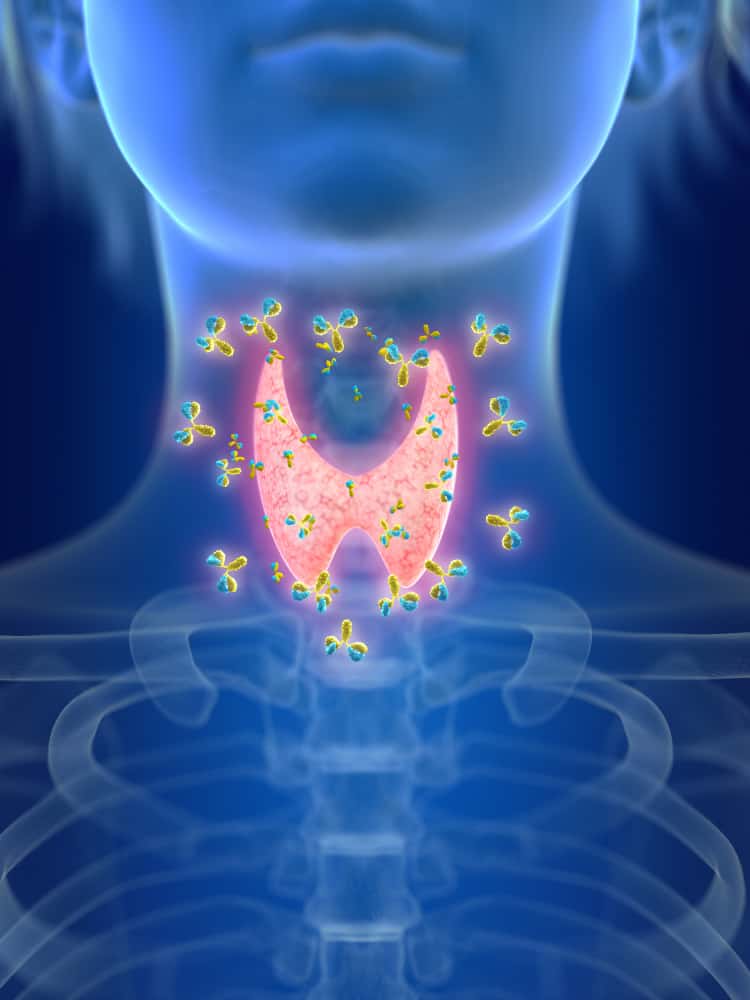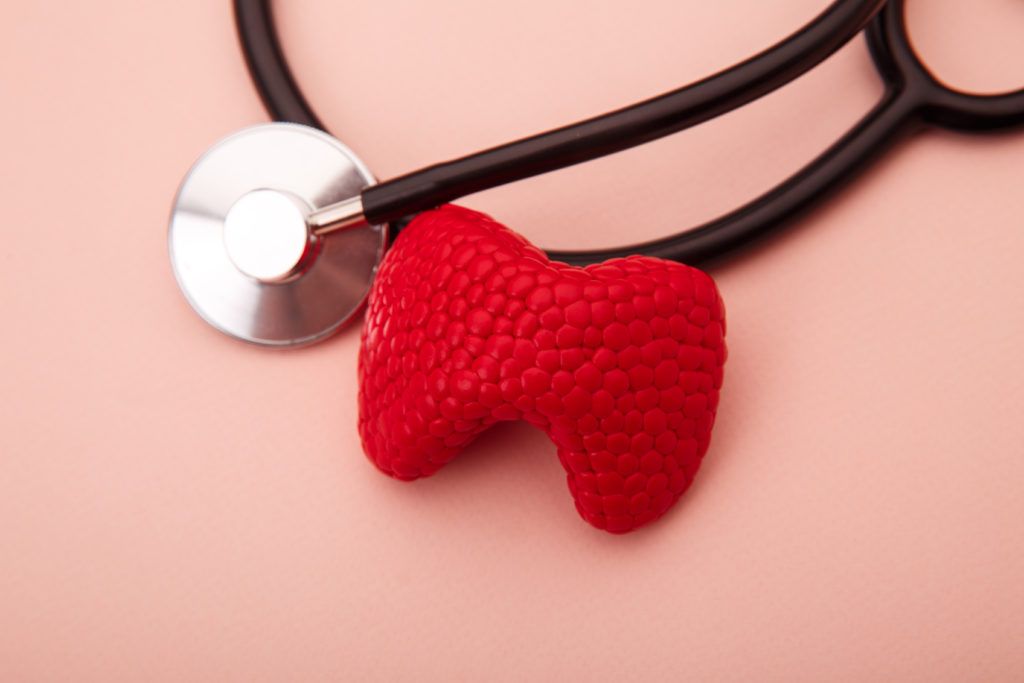The statistics surrounding Hypothyroidism and Hashimoto’s are quite concerning:
- One in five Americans is estimated to have hypothyroidism.
- If you’re a woman, you’re eight times more likely to develop a thyroid problem.
- 60 percent don’t know they have a problem with their thyroid.
It’s Important to Know What’s Causing Your Hypothyroidism

- Your doctor has not tested for antibodies that would lead to a diagnosis of Hashimoto’s.
- Your doctor thinks the treatment of hypothyroidism and Hashimoto’s should be the same, and so does not make the distinction.
This is because many conventional doctors still think the best approach for treating both hypothyroidism and Hashimoto’s is simply hormone replacement therapy.
This approach is entirely wrong and needs changing.
Let’s look at these two conditions and see what the differences are in diagnostics and treatments. Because we believe knowing whether you have hypothyroidism or Hashimoto’s — or both — is critical for developing a comprehensive and personalized treatment plan.
What is Hashimoto’s Thyroiditis?
Hashimoto’s is an autoimmune disorder. An autoimmune disease or disorder is when the immune system becomes overactive and mistakes healthy tissue for invaders and attacks these tissues.
With Hashimoto’s, the immune system attacks the thyroid gland. Eventually, if the attack on the thyroid isn’t stopped or slowed, the gland won’t be able to produce thyroid hormone. This destruction results in hypothyroidism.
This process can take years or even decades to develop. In fact, on average, a person has Hashimoto’s for about 10 years before they finally receive a diagnosis. This is because symptoms don’t become bad enough for attention until the late-stage diagnosis of the disease.
The good news is that if you’re reading this, you’re aware that your hypothyroidism might be Hashimoto’s. That means you can be tested for Hashimoto’s and begin approaching your disease from a more functional standpoint.
This is significant because there’s a lot that can be done for autoimmune diseases. Keep in mind that if you have Hashimoto’s and don’t identify and address it, over time, more and more damage occurs to the thyroid gland.
Dr. Berutti is an excellent doctor. I started going to her practice in 2015. Dr. Berutti listens to your health concerns and then puts together a plan that works just for you. Best individual health care I have ever had from a doctor. Dr. Berutti’s staff/team are as attentive as she is and I have never had a question, email, or phone call go unanswered. Excellent Service! I have never felt better, thanks to Dynamic Life Health Center.” – Mary H.
What is Hypothyroidism (Low Thyroid)?
By definition, hypothyroidism is a clinical state characterized by low levels of thyroid hormone in the body, plus noticeable symptoms.
You can also be considered as having subclinical hypothyroidism: You aren’t having symptoms, but lab testing shows that you have low thyroid hormone levels.
Low thyroid hormone levels can be caused by:
- Iodine deficiency
- Certain medications
- Damage to the thyroid
- Hashimoto’s disease
- Surgical removal of the thyroid
- Nutrient deficiencies
- Cortisol imbalances
Iodine deficiency used to be a big problem in the U.S. until 1924. That’s when the government began adding iodine to table salt. In countries where iodine is added to salt, most hypothyroid cases are actually Hashimoto’s thyroiditis.
The Difference between Hypothyroidism and Hashimoto’s Disease
The major difference between these two conditions is their underlying cause. Again, many doctors don’t seem to think the cause matters because they focus on treating the symptoms.
However, if you want the best chance at an optimal life with your thyroid condition, knowing the cause is essential because it means you can work on both the symptoms and the root cause.
Our providers take a functional medicine approach to your thyroid conditions and understand that a full thyroid panel of testing needs to be completed to identify the correct issue. This differs from a conventional approach where providers will usually only test your TSH level and T4. That kind of “surface” testing won’t show the root of all possible causes, nor will it identify Hashimoto’s disease.
I have been a patient of Dr. Berutti for years. She is a doctor that spends time with each patient and listens. She is truly intelligent when solving any health problem. If other doctors have told you there is no hope for healing, come here. She will creatively problem solve and help you. She has helped me so much.” – Lindsey B
One thing is certain: If you’ve been tested for hypothyroidism, you should also absolutely be tested for Hashimoto’s disease.
Here at Dynamic Life Health Center, we order a full panel of thyroid testing to get a complete picture of your thyroid, including testing for the possibility of Hashimoto’s disease. For more information about our diagnosis and treatment of Hashimoto’s, please click here.
What it Means if You Have Hashimoto’s Disease

With an autoimmune disease, you can take steps to return your immune system back to homeostasis.
First, you’ll need to identify your personal triggers. A few common triggers of autoimmune disease include:
- Food sensitivities (gluten is a major culprit here, but not the only one by far)
- Intestinal permeability (leaky gut)
- Chronic infections
- Stress
- Toxins
- Nutrient deficiencies
- Cortisol imbalances
When you reduce your triggers, you also reduce the attack on your thyroid.
Other Steps to Help Those With Hashimoto’s
- Specialized diets
- Food sensitivity and GI testing
- Improving detoxification pathways
- Reducing inflammation
- Supplementation
- Iodine
- Reducing stress
- Emotional therapy
- Treating infections
- Low dose naltrexone
- Laser therapy
- And, of course, correcting thyroid hormone levels
Find Out If Your Hypothyroidism is Hashimoto’s Disease at DLHC in Southlake, Texas
Don’t ignore early signs of hypothyroidism, which include:
- Fatigue
- Weight gain
- Difficulty losing weight
- Increased sensitivity to cold
- Constipation
- Dry skin
- Hoarseness
- Muscle weakness
If you have thyroid conditions that run in your family, we recommend being tested in your thirties.
At the Dynamic Life Health Center, we have helped hundreds of people uncover their autoimmune diseases and treat the underlying causes resulting in greatly reduced symptoms. Identifying and managing thyroid health to optimal levels where you can feel good again can take up to a year. The reason for this is that everyone is unique in the way their body responds to thyroid medication, AND there may be other things contributing to your thyroid problems.
When it comes to thyroid hormone treatment, our patients are often happy to find that a Hashimoto diagnosis means a better treatment plan that reduces the overall amount of thyroid hormones needed. It gives us a clearer picture of your health so we can provide you with the steps you need to improve your quality of life.
If you suspect your hypothyroidism is actually Hashimoto’s (and statistically, it very well could be), you can make an appointment with the Dynamic Life Health Center today. Simply fill out the contact form here or call 817-912-1600.
If you aren’t in the Dallas/Fort Worth area, we recommend checking the American Thyroid Association website or the Institute for Functional Medicine.
Contact our New Patient Coordinator for More Information
When many patients come to see us, they have lost hope because they’ve felt unwell for so long and don’t see any light at the end of the tunnel. It’s rewarding as a practitioner to help so many people realize a much better “normal” and a regained sense of wellness!
Please call 817-539-6168 for more information about how our clinic and Dr. Berutti can help you with your health goals and when you are ready to schedule an appointment.
We look forward to the opportunity to restore your health and regain your vitality for life!
Call our New Patient Coordinator to get all your questions answered.
817-539-6168
Or fill in the inquiry form below and tell us the best way to reach you.
Contact
"*" indicates required fields
